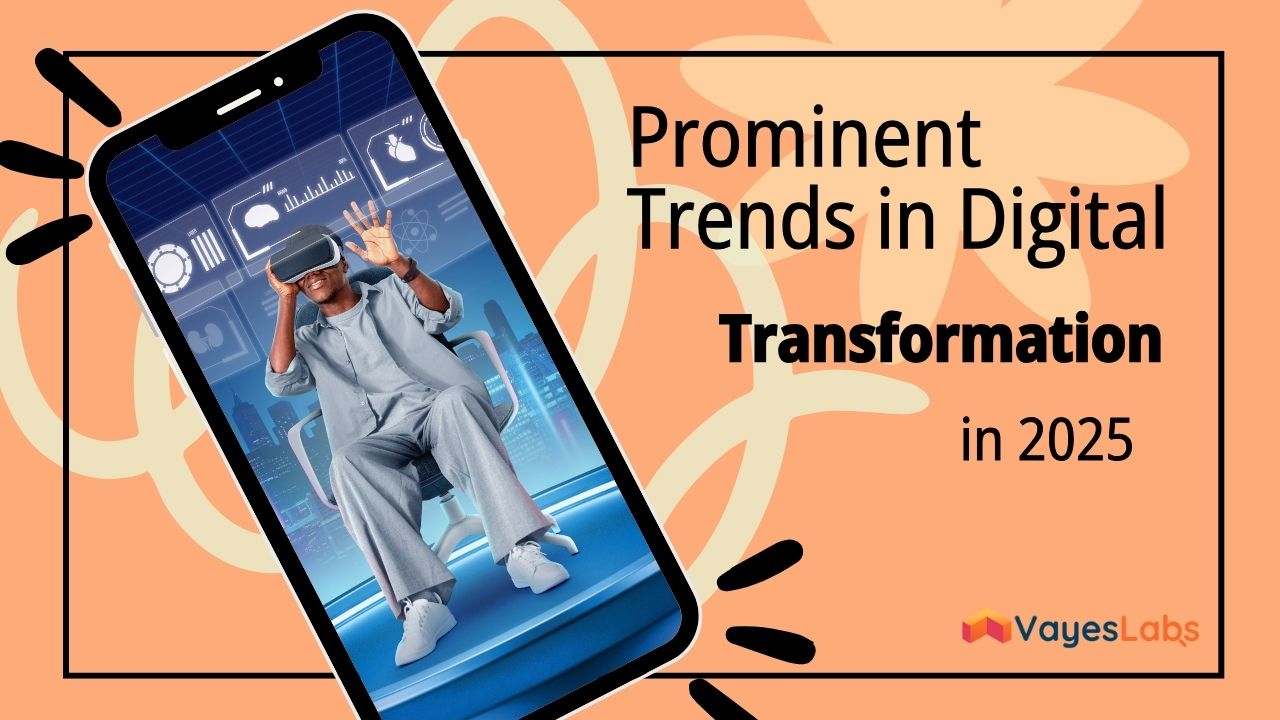Table of Contents
-
What is Digital Transformation?
-
Why is Digital Transformation Important in 2025?
-
Key Digital Transformation Trends in 2025
-
How Can Businesses Adapt to These Trends?
-
Challenges of Digital Transformation in 2025
-
Future Outlook of Digital Transformation
Digital transformation refers to businesses leveraging technology to reshape their processes, customer experiences, and operations. The year 2025 stands out as a period where technology is rapidly advancing, and businesses are increasingly focusing on digitalization to gain a competitive advantage. No longer limited to large corporations, small and medium-sized enterprises are also embracing the opportunities offered by digital transformation. This process is not just about technological change but also requires a cultural, strategic, and organizational shift.
In 2025, digital transformation is gaining momentum as businesses adopt technologies like artificial intelligence, Internet of Things (IoT), cloud computing, and big data. These technologies enable businesses to better understand customer needs, optimize processes, and develop new revenue models. Additionally, areas like cybersecurity and data privacy are becoming increasingly critical as digitalization grows. So, what trends will stand out in digital transformation in 2025, and how can businesses adapt to these changes?
What is Digital Transformation?
Digital transformation involves businesses modernizing their processes, products, and services using technology and restructuring them with a customer-centric approach. This process goes beyond merely implementing new technologies; it also encompasses transforming organizational culture, business models, and customer interactions. The primary goal of digital transformation is to make businesses more efficient, innovative, and competitive.
Technological Integration: Businesses integrate technologies like artificial intelligence, IoT, and cloud computing into their processes.
Customer-Centricity: Analyzing customer data enables personalized experiences.
Data Management: Big data and analytical tools facilitate more informed business decisions.
Cultural Shift: Employees’ digital skills are enhanced, and an innovative culture is adopted.

This process enables businesses to adapt to market dynamics and meet customer expectations while improving operational efficiency. For instance, in the retail sector, digital transformation enhances customer satisfaction by developing online shopping platforms and implementing systems that offer personalized recommendations.
Why is Digital Transformation Important in 2025?
In 2025, digital transformation is no longer an option but a necessity for businesses. The rapid advancement of technology, changing customer expectations, and increasing competition are pushing businesses toward digitalization. The importance of digital transformation is evident in the following areas:
Competitive Advantage: Digitized businesses offer faster and more efficient services compared to their competitors.
Customer Expectations: Consumers expect personalized and fast services, which digital transformation addresses.
Efficiency Gains: Automation and data analytics optimize processes and reduce costs.
Innovation: New technologies enable businesses to develop new products and services.
Global Reach: Digital platforms make it easier for businesses to reach customers worldwide.
For example, a manufacturing company can use IoT technology to monitor production processes, reducing errors and achieving cost savings. Similarly, in the service sector, artificial intelligence-powered chatbots make customer service available 24/7.
Key Digital Transformation Trends in 2025
The year 2025 will be defined by digital transformation with innovative technologies and approaches taking center stage. Below are the key trends that will stand out in 2025, explained in detail:
Artificial Intelligence and Machine Learning
Artificial intelligence (AI) and machine learning will revolutionize business data analytics, customer service, and operational processes in 2025. AI enables personalized marketing campaigns by analyzing customer behavior, while machine learning accelerates process automation.
Personalization: AI analyzes customer data to provide tailored solutions.
Automation: Repetitive tasks are automated using AI-powered tools.
Decision Support: Machine learning provides businesses with more accurate predictions.
For example, in retail, AI can optimize inventory management by analyzing customer habits, boosting sales.
Internet of Things (IoT)
IoT enhances business efficiency by enabling device communication. In 2025, IoT will become widespread in manufacturing, logistics, and healthcare sectors.
Real-Time Data: IoT devices provide businesses with real-time data.
Supply Chain Management: IoT optimizes logistics processes.
Smart Products: IoT makes consumer products more functional.
For instance, smart sensors can detect issues in production lines early, reducing maintenance costs.
Cloud Computing and Hybrid Solutions
Cloud computing enhances businesses’ data storage and processing capabilities. In 2025, hybrid cloud solutions will stand out for their security and flexibility.
Flexibility: Hybrid cloud is scalable to meet business needs.
Security: Advanced encryption methods enhance data security.
Collaboration: Cloud-based tools facilitate remote teamwork.
Cloud-based systems accelerate data analytics processes, enabling faster decision-making. Additionally, hybrid cloud solutions simplify the integration of on-premises and cloud-based systems.
Metaverse and Extended Reality
Metaverse will be one of the most exciting areas of digital transformation in 2025. Augmented reality (AR) and virtual reality (VR) will offer new opportunities in marketing, education, and entertainment.
Virtual Experiences: Customers can experience products in a virtual environment.
Education: AR/VR provides interactive learning environments.
Marketing: Brands create innovative campaigns in the metaverse.
For example, a fashion brand can create a metaverse platform where customers can virtually try on clothes.
Cybersecurity and Data Privacy
As digitalization increases, cybersecurity and data privacy become more critical. In 2025, businesses will focus on advanced security protocols and compliance with data protection regulations.
Zero Trust Model: Every user and device is verified.
Data Encryption: Sensitive data is protected.
Regulatory Compliance: Compliance with GDPR and similar regulations is ensured.
Businesses can maintain customer trust by taking proactive measures against cyber threats.
How Can Businesses Adapt to These Trends?
Adapting to digital transformation trends in 2025 is critical for business success. Businesses can follow these steps to keep up with these changes:
Strategy Development: Businesses should define digital goals and create a roadmap.
Technology Investments: Investments should be made in AI, IoT, and cloud computing.
Employee Training: Employees’ digital skills should be enhanced.
Customer-Centricity: Analyzing customer data enables personalized services.
Collaborations: Businesses should work with technology providers and consultants.
Flexibility: Flexible processes should be established to adapt to changing trends.
For example, a logistics company can optimize delivery processes and improve customer satisfaction using IoT and cloud computing.
Challenges of Digital Transformation in 2025
Digital transformation offers numerous opportunities but also comes with challenges. The main challenges businesses may face during this process include:
Cost: Investing in new technologies can require significant costs.
Resistance: Employees and management may resist change.
Skill Gaps: Finding personnel skilled in managing digital technologies can be challenging.
Data Security: Cyber threats and data breaches pose risks.
Integration: Integrating new technologies with existing systems can be complex.
To overcome these challenges, businesses should develop change management strategies and continuously train their employees.
Future Outlook of Digital Transformation
The year 2025 will be just a starting point for digital transformation. In the future, as technology continues to advance, businesses will develop more innovative and customer-centric solutions. Technologies like artificial intelligence, metaverse, and IoT will completely redefine business models. Additionally, sustainability and ethical technology use will become integral to digital transformation.
For example, metaverse platforms will create new marketing opportunities by enhancing brand-customer interactions. Similarly, sustainability-focused technologies will help businesses reduce their environmental impact. To prepare for these changes, businesses should strengthen their digital strategies now. Those that invest in technology, train their employees, and prioritize customer needs will gain a competitive advantage in 2025 and beyond. Digital transformation is not just a trend but a necessity for businesses’ long-term success.
For more information and to start your digital transformation journey, contact us.




